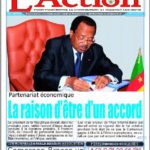In a bid to ease the task for transporters who began crying foul against the increase of fuel prices that took effect July 1, 2014, government has reduced the flat rate tax commonly called “l’impot libératoire” by 50 %.
The flat rate tax is a fee paid by commercial motor bikes, township taxis and interurban transport buses. Instead of FCFA 22.500 every three months, township taxis will henceforth pay just FCFA 11.500. This comes to dampen the effect of the increase of hydrocarbons prices at filling stations. July 1 fuel price increase is a response to heavy pressure exerted by the Bretton Woods institute on Cameroon for close to a decade. Fuel prices had risen on the World market long ago. But in its drive to maintain the cost of living for Cameroonians at bay, government since 2008 had been footing the difference of what was supposed to be the real price at the filling station. Before the July 1 increase, a litre of super fuel sold at FCFA 569 while a litre of diesel sold at FCFA 520 at the fuel station. According to state radio’s economic desk editor, Roger Betala, “government has been paying FCFA 224 for every litre of super consumers bought and FCFA 200 on every litre of diesel bought at the filling station.” The recent increase, Betala said is not a complete cancellation of this subvention. “Government has only reduced it by 35 percent because over the years the weight became unbearable.” Between 2008 and 2013 government is reported to have spent a whooping FCFA 1200 billion on fuel subsidies. This is far more than the country’s 2014 investment budget. And for the first semester of 2014 only, FCFA 157 billion has already been spent on fuel subsidies. For a country that is barely struggling to stand on its feet, donor agencies spearheaded by the Bretton Woods institute cried out loud that it was too much. The Bretton Woods institute argues that subsidizing fuel does not help in developing the country in anyway. It may help to spare the government some riots but in the long run, the economy does not develop. And more so, the subsidies benefit the rich more than the poor. But if the subsidies were redirected to the construction of roads, health centres and hospitals, schools as well as hydro electric dams to up energy supply which of course powers industry nobody would cry against fuel prices in the medium term. Government resisted, but was finally forced to heed to the pressure though not totally. The Secretary general at the Prime minister’s office, Louis Paul Motaze in the communiqué announcing the price increase says “the move is aimed at saving funds to carry out long term development projects that will help move the national economy forward.” To accompany the price climb, government is taking measures to increase salaries of state functionaries as well as the minimum wage for every worker whether of the public or private sector. Government has maintained its 100% subsidy on kerosene. Thus, its price (FCFA 350) remains unchanged.
Benedict Ndinwa
Les
nouveaux montants de l’impôt libératoire
Catégories
Anciens montants
Nouveaux montants
A
de 0 F à 20.000 francs
de 0 F à 10.000 francs
B
de 20.001 F à 40.000 francs;
de 10.001 F à 20.000 francs
C
de 40.001 F à 50.000 francs
de 20.001 F à 25.000 francs
D
de 50.001 F à 100.000 francs
de 25.001 F à 50.000 francs
Les nouveaux montants de la taxe à l’essieu
Catégorie de véhicules
Anciens montants
Nouveaux montants
Pour des véhicules de charge utile égale ou
supérieure à 3 tonnes et inférieure à 5 tonnes
9000 francs
4500
francs
Pour des véhicules de charge utile égale ou
supérieure à 5 tonnes et inférieure à 16 tonnes
18750 francs
9375 francs
Pour des véhicules de charge utile égale ou
supérieure à 16 tonnes et inférieure à 20 tonnes
33750 francs
16 875 francs
Pour les véhicules de charge utile égale ou
supérieure à 20 tonnes et inférieure à 30 tonnes
56250 francs
28 125 francs
Pour les véhicules de charge utile égale ou
supérieure à 30 tonnes
75000 francs
37500 francs
Pour les véhicules destinés au transport des grumes
et des bois débités
112500 francs
56.250 francs
véhicules immatriculés à l’étranger
15 000 francs
7500 francs
Les nouveaux montants de la taxe de stationnement
Catégorie de véhicules
Anciens montants
Nouveaux montants
mototaxis
3000 francs
1500
francs
Taxis
10000 francs
5000 francs
Autobus
15 000 francs
7500 francs




